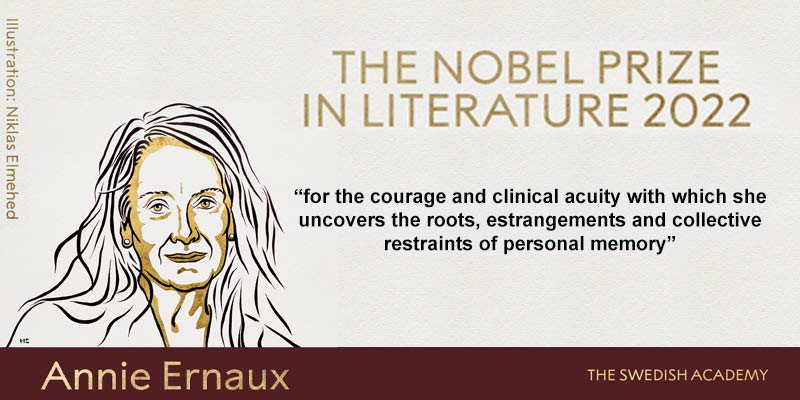- World
- Oct 06
French author Annie Ernaux wins Nobel Prize in Literature
French author Annie Ernaux won the 2022 Nobel Prize in Literature for the courage and clinical acuity with which she uncovers the roots, estrangements and collective restraints of personal memory.
Last year’s Prize went to the Tanzanian-born, UK-based writer Abdulrazak Gurnah, whose novels explore the impact of migration on individuals and societies. Gurnah was only the sixth Nobel literature laureate born in Africa.
An ethnologist of herself
• Annie Ernaux was born in 1940 and grew up in the small town of Yvetot in France’s Normandy. In her writing, Ernaux consistently and from different angles, examines a life marked by strong disparities regarding gender, language and class. Her path to authorship was long and arduous.
• Despite her classic, distinctive style, she declares that she is an “ethnologist of herself” rather than a writer of fiction.
• There is an important political dimension in Ernaux’s language. Her writing is always shadowed by a feeling of treason against the social class from which she departs. She has said that writing is a political act, opening our eyes for social inequality. And for this purpose she uses language as “a knife”, as she calls it, to tear apart the veils of imagination. In this violent yet chaste ambition to reveal the truth.
• Annie Ernaux’s debut was Les armoires vides (1974; Cleaned Out, 1990), and already in this work she started her investigation of her Norman background, but it was her fourth book, La place (1983; A Man’s Place, 1992), that delivered her literary breakthrough. In a scant hundred pages she produced a dispassionate portrait of her father and the entire social milieu that had fundamentally formed him.
• A few years later, she gave us an even shorter portrait, now of her mother, simply called Une femme (1987; A Woman’s Story, 1990).
• A masterpiece from her production is the clinically restrained narrative about a 23-year-old narrator’s illegal abortion, L’événement (2000; Happening, 2001).
• The ambition to rip apart the veil of fiction has led Ernaux to a methodic reconstruction of the past but also to an attempt to write a ‘raw’ type of prose in the form of a diary, registering purely external events. We see this in books such as Journal du dehors (1993; Exteriors, 1996) or La vie extérieure 1993–1999 (2000; Things Seen, 2010).
• Ernaux’s writing is throughout subordinated to the process of time. Nowhere else, the power of social conventions over our lives plays such an important role as in Les années (2008; The Years, 2017). It is her most ambitious project, which has given her an international reputation and a raft of followers and literary disciples. It has been called “the first collective autobiography”.
Some of her famous works are:
• A Woman’s Story
• Cleaned Out
• Positions
• A Man’s Place
• Simple Passion
• Passion Perfect
• A Frozen Woman
• Exteriors
• Shame
• I Remain in Darkness
• Happening
• The Possession
• Things Seen
• A Man’s Place
• The Years
• A Girl’s Story
• Exteriors
• Getting Lost
• Do What They Say or Else.
Manorama Yearbook app is now available on Google Play Store and iOS App Store

